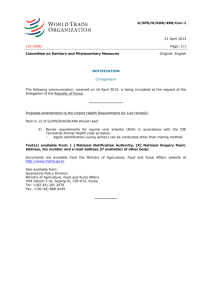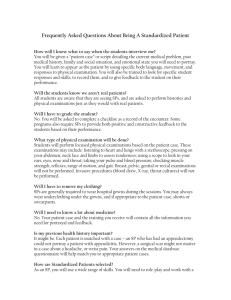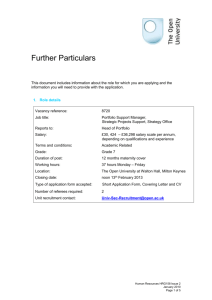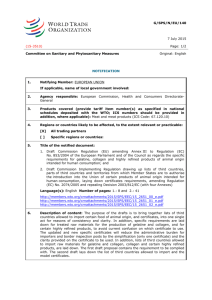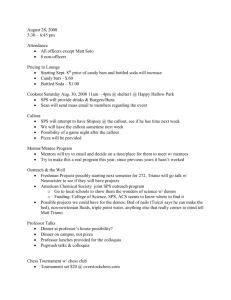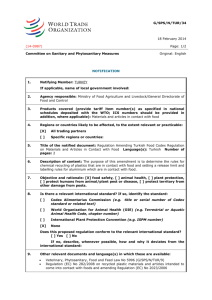CODES ETHICS N
advertisement
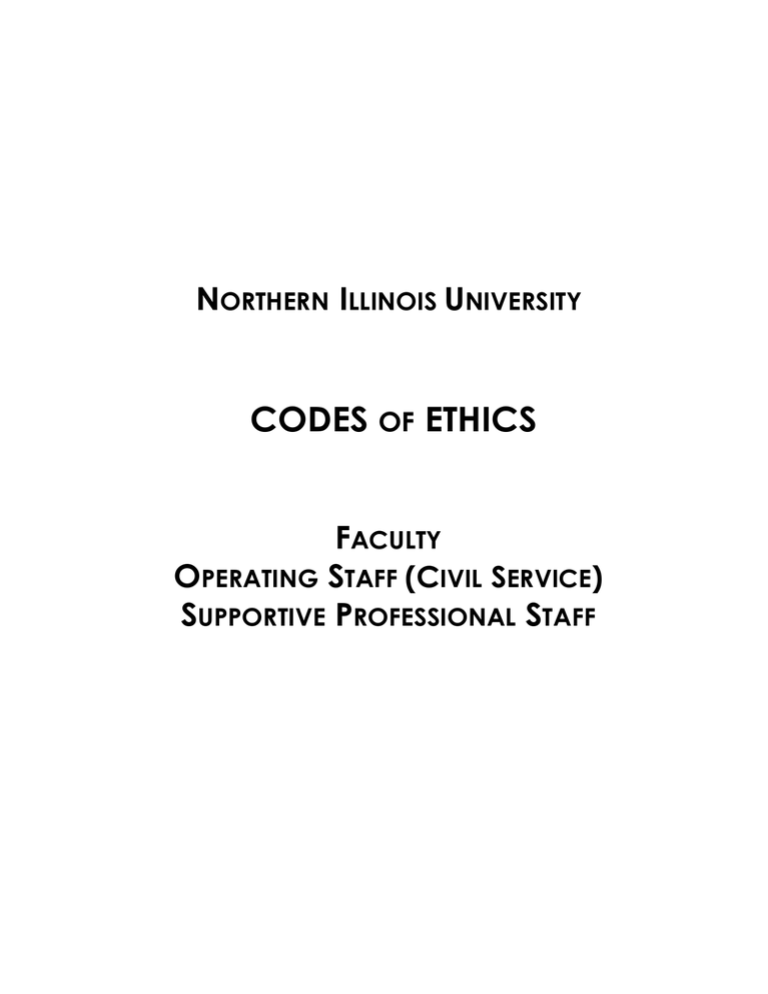
NORTHERN ILLINOIS UNIVERSITY CODES OF ETHICS FACULTY OPERATING STAFF (CIVIL SERVICE) SUPPORTIVE PROFESSIONAL STAFF FACULTY STATEMENT OF PROFESSIONAL ETHICS FOR FACULTY AT NORTHERN ILLINOIS UNIVERSITY I. Faculty, guided by a deep conviction of the worth and dignity of the advancement of knowledge, recognize the special responsibilities placed upon them. Their primary responsibility to their subject as researchers and scholars is to seek and to state the truth as they see it. They accept the obligation to exercise critical self-discipline and judgment in using, extending, and transmitting knowledge. They practice intellectual honesty. Although faculty may follow subsidiary interests, these interests must never seriously hamper or compromise their freedom of inquiry. II. As teachers, faculty encourage the free pursuit of learning in their students. They hold before them the best scholarly and ethical standards of their discipline. Faculty demonstrate respect for student as individuals and adhere to their proper roles as intellectual guides and counselors. Faculty make every reasonable effort to foster honest academic conduct and to ensure that their evaluations of students reflect each student’s true merit. They respect the confidential nature of the relationship between professor and student. They do not discriminate against, exploit or harass students. They acknowledge significant academic or scholarly assistance from them. They protect their academic freedom. III. As colleagues, faculty have obligations that derive from common membership in the community of scholars. Faculty do not discriminate against, exploit or harass other faculty member or staff. They respect and defend the free inquiry of associates. In the exchange of criticism and ideas faculty show due respect for the opinions of others. Faculty acknowledge academic debt and strive to be objective in their professional judgment of colleagues. Faculty accept their share of faculty responsibilities for the governance of their institution. IV. As members of an academic institution, faculty seek above all to be effective teachers and scholars. Although faculty observe the stated regulations of the institution, provided the regulations do not contravene academic freedom, they maintain their right to criticize and seek revision. Faculty give due regard to their paramount responsibilities within their institution in determining the amount and character of work done outside it. When considering the interruption or termination of their service, faculty recognize the effect of their decision upon the program of the institution and give due notice of their intentions. V. As members of their community, faculty have the right and obligations of other citizens. Faculty measure the urgency of these obligations in the light of their responsibilities to their subject, to their students, to their profession, and to their institution. When they speak or act as private persons they avoid creating the impression of speaking or acting for their college or university. As citizens engaged in a profession that depends upon freedom for its health and integrity, faculty have a particular obligation to promote conditions of free inquiry and to further public understanding of academic freedom. Approved by the University Council, November 7, 2001. Source: http://www3.niu.edu/u_council/faculty_senate/bylaws/index.shtml#ethics OPERATING STAFF (CIVIL SERVICE) ETHICS STATEMENT All Operating Staff are committed to performing their duties in a professional and conscientious manner in the furtherance of the mission of Northern Illinois University. Each Operating Staff member has specific and often unique duties which make each an integral part of the university. All Operating Staff are dedicated to supporting all other constituencies of the university. The Operating Staff is committed to consistently providing the highest quality service and support to the NIU community and the community at large in accordance with the following guidelines: The Operating Staff shall maintain the highest standards of professionalism in the performance of their duties. The Operating Staff shall treat all members of the university community, as well as the community at large, with the utmost respect by displaying a pleasant and civil demeanor at all times. Further, all Operating Staff shall be respectful of and sensitive to the needs of the many diverse cultures represented at NIU. The Operating Staff shall be honest and ethical in the performance of their assigned duties. Further, Operating Staff shall be trustworthy and abide by all Statute and Rules as established by the State University Civil Service System (SUCSS), and by those policies and procedures established by the Board of Trustees and the constitution of NIU. Those Operating Staff who deal with issues and matters of a personal or sensitive nature shall be committed to maintaining the highest degree of integrity by not disclosing such information to disinterested parties. The Operating Staff shall maintain appropriate levels of confidentiality when dealing with non-public information. The Operating Staff shall be committed to supporting the academic, research, and service mission of the university. They shall perform their duties in support of the furtherance of knowledge by assisting faculty in their roles in the academy. Operating Staff shall provide all university constituencies with excellent service and assist students in their university experience. Adopted by Operating Staff Council – August 8, 2002 Source: http://www.niu.edu/osc/aboutosc/ethicsstatement.shtml SUPPORTIVE PROFESSIONAL STAFF A Statement of Professional Ethics for Members of the Supportive Professional Staff at Northern Illinois University Approved May 2, 2002 Introduction Members of the Supportive Professional Staff (SPS) perform a wide variety of duties and functions within the community of learners at Northern Illinois University. Recognizing our responsibilities to this university, to the academic community generally, to our respective professions, and to society as a whole, the Supportive Professional Staff Council has adopted the following statement on professional ethics. The principles that follow are not laws or regulations (such as those enacted by the Legislature, the Board of Trustees, and other bodies), but rather standards that are intended to define, broadly, the essentials of appropriate and honorable conduct for SPS members. No statement of standards can cover all possible eventualities or address all situations with ethical implications, and we are not trying to do that here. At base, however, the Council was guided by five “bedrock” principles, from which all the standards set forth in the following statement derive: 1. Do no harm; 2. Act to benefit others; 3. Act to promote justice and fairness; 4. Be respectful of autonomy (of self and others); and 5. Act with integrity. The following statement is proffered as a minimum standard of professionalism, not as an objective to be achieved in itself. Definition As defined in Article 2, Section 2.52, of the NIU Constitution, Supportive Professional Staff members are “those whose appointments designate them as holding (a) no-rank faculty status, or (b) faculty rank with administrative assignments outside the academic division of the university.” Statement of Principles SPS members will strive to apply the following principles in their work, whether that work is with students, university administrators or officials, faculty, Operating Staff, other SPS, or the general public: I. SPS members shall be dedicated to providing and maintaining excellence in the area(s) of their particular responsibility. They accept the need for critical self-knowledge, discipline, and judgment in all that they do. II. SPS members shall abide by the standards of professionalism which apply to them—whether as members of a given profession or occupation, as members of the academic community, or as members of the NIU community of learners. They shall be honest intellectually and professionally in their work, and will strive to uphold that honesty by taking appropriate corrective steps (for example, consultation with the Ombudsman or other appropriate university official) with respect to those who may be deficient in character or competence, or who may be engaging in fraud, deception, or other dishonest practices. III. SPS members shall respect and abide by the laws, policies, and regulations in force at all times. They shall also recognize an obligation to evaluate those laws, policies, or regulations critically, and to seek needed revisions thereto, when they are perceived to be contrary to the best interests of the community. IV. SPS members shall behave respectfully toward all with whom they interact. They shall strive to remain objective in their dealings with others, and to avoid any harassing or disrespectful behavior. V. SPS members shall respect, within the constraints of applicable law (and university policies, published standards of appropriate professional organizations, etc.), the confidences and the privacy of others. VI. SPS members, accepting the obligations and responsibilities attendant upon their common membership in the community of scholars, shall be committed to education. SPS members shall continue to study, apply, and advance knowledge whenever possible. They shall consult other professionals and NIU employees as necessary and appropriate, and shall not fail to give proper credit to those with whom they consult or on whose expertise they draw. VII. SPS members shall accept their responsibility, to the extent allowed by their primary duties and responsibilities, to participate in activities which contribute to the improvement of the university and to the betterment of the community as a whole, including university governance. VIII. SPS members shall support access to education for all people who desire it, and the right of all citizens to freedom of inquiry and expression, as guaranteed by the statutes, regulations, and policies of the United States, the State of Illinois, and Northern Illinois University. IX. As teachers, SPS members shall encourage freedom of inquiry in their students, and respect it in their colleagues. SPS members with teaching responsibilities shall demonstrate respect for their students and those students’ rights, and will ensure that the students’ grades or evaluations will be based solely and fairly on the merits of the students being graded. X. To the extent that they do not interfere with their primary duties and responsibilities to the university, SPS members may pursue other interests and activities while employed at NIU. SPS members shall not make inappropriate use of university facilities or resources, or of the university’s name, in the pursuit of outside interests. XI. SPS members are also members of society as a whole, and as such they enjoy the rights and obligations of any other citizen. Those rights and obligations, however, shall be balanced against the SPS members’ responsibilities to their employer, their colleagues, their students (if any), and their profession. When they speak or act as private persons, SPS members shall avoid creating any impression that they speak for the university, the SPS, or anyone other than themselves. Acknowledgments In crafting this statement, the Council considered several sources, including the statement under consideration by the NIU Faculty Senate, the Statement of Ethical Principles and Standards of the American College Personnel Association, the Principles of Medical Ethics of the American Medical Association, the Standards of Practice of the University and College Ombuds Association, the Ethics Code of the American Psychological Association, and the Rules of the American Bar Association. Respectfully submitted Michael Spires Division 3 Representative Source: http://www.niu.edu/spsc/links/ethics.pdf
